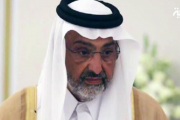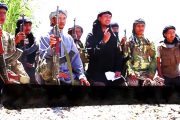Funding might be one of the forms of Doha’s support for terrorism, but it is not the only means. Qatar, as part of its endeavors to embrace extremist groups and provide shelter for them, has taken several measures, such as paying money to have those terrorists released from U.S. prisons and allowing them to obtain the Qatari nationality and appear on its media platforms, which have been launched to recruit terrorists from Arab and European countries.
The confessions made by Saleh Al-Qaraawi, founder of Abdullah Azzam Brigades, are the best proof of Doha’s support for extremist groups with the aim of increasing pressure on the Arab regimes and playing a greater political role in the Arab region.
During his interrogation by Saudi authorities after being extradited by Pakistan five years ago, Al-Qaraawi, who is considered one of the most dangerous leaders of Al-Qaeda and wanted by Saudi Arabia, the UAE and the Interpol, unveiled Qatar’s involvement in providing financial support for Al-Qaeda activities, and hosting Afghan detainees from the Guantanamo Bay Detention Camp and granting them the Qatari nationality after reaching an agreement on that score with Taliban group in Afghanistan, which has diplomatic representation in the Qatari capital .
Al-Qaraawi also confessed to receiving funds from many Qatari figures in favor of Al-Qaeda terrorist group during his stay in Iran. After leaving Iran for Waziristan on the border with Afghanistan, Al-Qaraawi jointed a terrorist group and agreed with Taliban to train its fighters on how to fight against U.S. and Afghan forces. He also witnessed negotiations between Taliban and the Americans, in which the former leader of Taliban Mullah Mohammed Omar demanded that Qatar hosts negotiations with the Americans for two reasons; the first one was Qatar’s support for Taliban, while the second was that Qatar had no embassy in Kabul after being destroyed in a U.S. military operation there.
Al-Qaraawi stated that the rounds of negotiations came up with a number of recommendations, including extraditing Afghans detained in the Guantanamo Bay detention camp to Qatar and allowing them to obtain the Qatari nationality after Doha approved this proposal. In return, Taliban pledged to hand over a kidnapped American soldier to the U.S. after having been seized by the group for ten years.
In 2008, Qatar received Jaralla Al-Marri, a Qatari national who was detained at the Guantanamo detention camp, from the U.S. and pledged that it will keep an eye on him and inform the U.S. Administration of any updates.
However, Al-Marri was seen in the same year wandering on London streets to propagate Jihadi thoughts. This move prompted the U.S. Administration to press Doha to withdraw him.
Qatar signed a deal in 2014 with U.S. President Barack Obama, upon which the Gulf statelet received five terrorists from the U.S. and pledged to keep them inside its territories. However, U.S. media personnel quoted Doha-based diplomats as saying that the five terrorists were seen living freely in Qatar shortly after the deal. At the end of the year, U.S. news websites reported that three of the five terrorists were seen fighting alongside ISIS fighters in Iraq and Syria. The three fighters were named as Mohamed Fadl, Abdul Haq Wasiq and Norullah Noori.
The Qatari authorities also provided shelter for Khalid Sheikh Mohammed, who vanished after the U.S. agencies informed Qatar of his location. Later on, reports indicated that he was hiding inside the house of the Qatari interior minister.
Terror financiers are living freely in Qatar:
Funding campaign was also praised by the extremist Egyptian preacher Wagdy Ghoneim, whom the US previously suspected of involvement in terrorist fundraising.
Terror financiers are living freely in Qatar despite being placed on a worldwide terrorism blacklist. For its part, the Qatari government does not feel shame to publically announce its support for terrorist groups, making use of Qatari businessmen and Islamic preachers to finance terrorist acts. Moreover, it pledges to protect the terror financiers, although they pose a threat to global security.
Besides providing terrorist groups with necessary funds, terror fundraisers also work on recruiting new fighters to carry out terrorist acts. The list of terror fundraisers includes:
Khalifa Muhammad Turki Al-Subaiy:
Al-Subaiy, a Qatari national born in 1965, was placed on the UN terror list in October 2008 for providing financial support for terrorist groups, including Al-Qaeda.
In January 2008, Al-Subaiy was convicted by a Bahraini court on charges of funding terrorist groups and helping fighters to travel outside Qatar to receive training on how to carry out terrorist acts. Al-Subaiy was close to Khalid Sheikh Mohammed, a senior leader of Al-Qaeda and the mastermind of the September 11 attacks.
Abd al-Rahman bin Umayr Al-Nuaymi:
Al-Nuaymi is a Qatari businessman and chairman of the Geneva-based Alkarama human rights organization. He was found guilty of transferring over £125 million to Al-Qaeda militants in Iraq and Syria, prompting the UK to freeze his assets and place him on its sanction list . Al-Nuaymi was also placed on the U.S. blacklist on charges of financing terrorist groups, including Al-Qaeda in Iraq and Syria, Al-Shabaab in Somalia and other terrorist groups in the Middle East.
Abd al-Wahhab Muhammad Abdul Rahman Al-Humayqani:
Born in Al-Bayda town in central Yemen, Al-Humayqani is a co-founder and secretary general of Al-Rashad Union and a member of the National Dialogue Conference. He also serves as a chairman of Alkarama, a Swiss-based independent human rights NGO operating in Yemen. Besides his work as a professor at Iman University, Al-Humayqani is the right-hand man of the main fundraiser of Al-Qaeda, Abdul Rahman Al-Nuaymi.
Al-Humayqani was designated by the U.S. as a terrorist in 2013 after being charged with financing terrorist groups, including Al-Qaeda. He was also accused by Washington of exploiting his position as head of a Yemeni charity to collect funds and transfer them to Al-Qaeda militants in the Arabian Peninsula. Furthermore, Al-Humayqani was found guilty of facilitating the transfer of funds from al-Qaeda supporters in Saudi Arabia to Yemen, prompting the U.S. Treasury Department to freeze Al-Humayqani’s assets under the U.S. jurisdiction and prohibit the Americans from dealing with him.
Tariq Al-Harzi:
Al-Harzi is one of the most dangerous terror fundraisers. He was accused of being in charge of the ISIS terrorist group in Syria and collecting funds to train the group’s fighters .
In its statement, the U.S. Treasury Department accused Al-Harzi of helping foreign fighters to cross the border from Turkey into Syria and facilitating the transfer of $2 million from Qatar to carry out terrorist acts.
Al-Harzi left Tunisia for Iraq in 2004 to put an end to his career as a prominent boxer. In 2006, Al-Harzi was captured by Iraqi forces before being transferred to Camp Cropper, where his right leg was cut off and replaced by an artificial leg following an airstrike by the U.S. warplanes. His phone calls with his father have been interrupted in 2009.
It is noteworthy that Qatar has not taken any legal action against extremist groups or their financiers living on its territories, including Khalifa Muhammad Turki Al-Subaiy and Abd al-Rahman bin Umayr Al-Nuaymi.
Qatar also hosts the largest number of ISIS accounts on Twitter, which are used by the group’s fighters to recruit young people and plan terrorist attacks.
A study has revealed that Doha provides shelter for terrorist groups and extremists of the Muslim Brotherhood Global Organization and enables them to use its media outlets to incite terrorist attacks with the aim of fomenting chaos in the Arab region.














































admin in: How the Muslim Brotherhood betrayed Saudi Arabia?
Great article with insight ...
https://www.viagrapascherfr.com/achat-sildenafil-pfizer-tarif/ in: Cross-region cooperation between anti-terrorism agencies needed
Hello there, just became aware of your blog through Google, and found ...